
Alexis Andrew Nicholas Koerner, known professionally as Alexis Korner, was a British blues musician and radio broadcaster, who has sometimes been referred to as "a founding father of British blues". A major influence on the sound of the British music scene in the 1960s, Korner was instrumental in the formation of several notable British bands including The Rolling Stones and Free.
Rhythm and blues, often abbreviated as R&B, is a genre of popular music that originated in African-American communities in the 1940s. The term was originally used by record companies to describe recordings marketed predominantly to urban African Americans, at a time when "urbane, rocking, jazz based music with a heavy, insistent beat" was becoming more popular. In the commercial rhythm and blues music typical of the 1950s through the 1970s, the bands usually consisted of piano, one or two guitars, bass, drums, one or more saxophones, and sometimes background vocalists. R&B lyrical themes often encapsulate the African-American experience of pain and the quest for freedom and joy, as well as triumphs and failures in terms of relationships, economics, and aspirations.
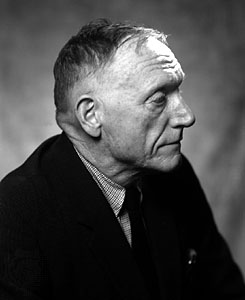
Robert Penn Warren was an American poet, novelist, and literary critic and was one of the founders of New Criticism. He was also a charter member of the Fellowship of Southern Writers. He founded the literary journal The Southern Review with Cleanth Brooks in 1935. He received the 1947 Pulitzer Prize for the Novel for All the King's Men (1946) and the Pulitzer Prize for Poetry in 1958 and 1979. He is the only person to have won Pulitzer Prizes for both fiction and poetry.
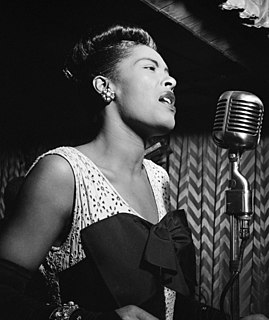
Eleanora Fagan, known professionally as Billie Holiday, was an American jazz and swing music singer. Nicknamed "Lady Day" by her friend and music partner Lester Young, Holiday had an innovative influence on jazz music and pop singing. Her vocal style, strongly inspired by jazz instrumentalists, pioneered a new way of manipulating phrasing and tempo. She was known for her vocal delivery and improvisational skills.
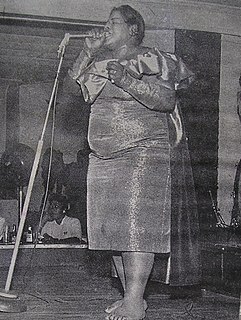
Mabel Louise Smith, known professionally as Big Maybelle, was an American R&B singer. Her 1956 hit single "Candy" received the Grammy Hall of Fame Award in 1999.

David "Honeyboy" Edwards was a Delta blues guitarist and singer from Mississippi.

Eddie Jones, better known as Guitar Slim, was a New Orleans blues guitarist in the 1940s and 1950s, best known for the million-selling song "The Things That I Used to Do", produced by Johnny Vincent for Specialty Records. It is listed in the Rock and Roll Hall of Fame's 500 Songs That Shaped Rock and Roll. Slim had a major impact on rock and roll and experimented with distorted overtones on the electric guitar a full decade before Jimi Hendrix.
Delaware is a state in the Mid-Atlantic region of the United States. The Delaware Symphony Orchestra is the largest organization of professional performers in the state, and is more than seventy years old; the orchestra evolved out of the Wilmington Symphony Orchestra. The Delaware Music Festival is a prominent music festival. Other musical institutions include OperaDelaware, the Music School of Delaware, and the School of Contemporary Music.

Georgie Fame is an English R&B and jazz musician. Fame, who had a string of 1960s hits, is still performing, often working with contemporaries such as Alan Price, Van Morrison and Bill Wyman. Fame is the only British music act to have achieved three number one hits with his only Top 10 chart entries: "Yeh, Yeh" in 1964, "Get Away", in 1966 and "The Ballad of Bonnie and Clyde" in 1967.

Albert Gene Drewery, known as Albert Collins and the Ice Man, was an American electric blues guitarist and singer with a distinctive guitar style. He was noted for his powerful playing and his use of altered tunings and a capo. His long association with the Fender Telecaster led to the title "The Master of the Telecaster".
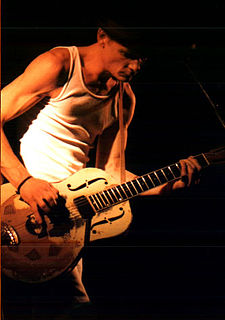
Christopher Becker Whitley was an American blues/rock singer-songwriter and guitarist. During his 25-year career he released more than a dozen albums, had two songs in the top 50 of the Billboard mainstream rock charts and received two Independent Music Awards. Whitley's sound was drawn from the traditions of blues, jazz and rock and he recorded songs by artists from many genres. He died in 2005 of lung cancer at the age of 45.

Anti- is an American record label founded in 1999 as a sister label to Epitaph. While Epitaph's focus has mostly been on punk rock, Anti-'s roster includes country, hip hop, reggae, soul, post-metal (Deafheaven), indie folk, rap rock, indie rock and Tom Waits.
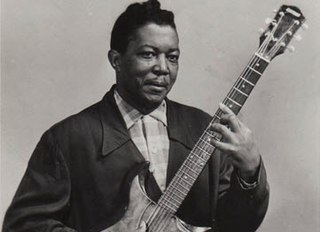
Robert Lee McCollum was an American blues musician who played and recorded under the pseudonyms Robert Lee McCoy and Robert Nighthawk. He was the father of the blues musician Sam Carr. Nighthawk was inducted into the Blues Hall of Fame in 1983.
Hudson Whittaker, known as Tampa Red, was an American Chicago blues musician.

Ace Records Ltd. was started in 1978. Initially the company only gained permission from the similarly named label based in Mississippi to use the name in the UK, but eventually also acquired the rights to publish their recordings. When Chiswick Records' pop side was licensed to EMI in 1984, Ace switched to more licensing and reissuing work. In the 1980s it also gained the licensing for Modern Records, and its follow-up company Kent Records, whilst in the 1990s, the company bought the labels including all original master tapes.

Robert Petway was an American blues singer and guitarist. He recorded only 16 songs, but it has been said that he was an influence on many notable blues and rock musicians, including John Lee Hooker, Muddy Waters, and Jimi Hendrix. There is only one known picture of Petway, a publicity photo from 1941. His birth name may have been Pettyway, Pitway, Petaway, or similar.
Amos Garrett is an American-Canadian blues and blues-rock musician, guitarist, singer, composer, and musical arranger. He has written instructional books about music and guitar. Garrett holds dual citizenship and was raised in Toronto and Montreal. He is best known for his guitar solo on Maria Muldaur's recording "Midnight at the Oasis". He has written books about music, such as "Amos Garrett—Stringbending: A Master Class".
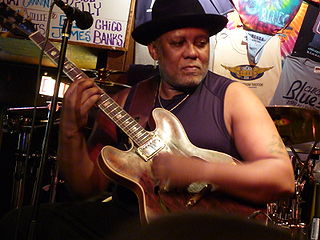
Carlos Johnson is an American blues guitarist and singer. He is left-handed, but plays a right-handed instrument upside-down like players such as Otis Rush, Albert King, and Jimi Hendrix. Johnson is known for his aggressive playing which has attracted audiences in Chicago blue scene since the 1970s. He has played on recordings of notable musicians including Billy Branch & The Sons of Blues and Son Seals.
Matthew T. Dickerson is a professor of computer science at Middlebury College in Vermont, a scholar of the fiction of J. R. R. Tolkien and the Inklings, a novelist, a blues musician and historian of music, a fly fisherman, a maple sugar farmer, and a beekeeper.

"I Feel So Bad" is a blues song written and originally recorded by Chuck Willis, and released in 1954. It rose to #8 on the Billboard Rhythm & Blues Chart in early 1954, and appears on the album Chuck Willis Wails the Blues.














